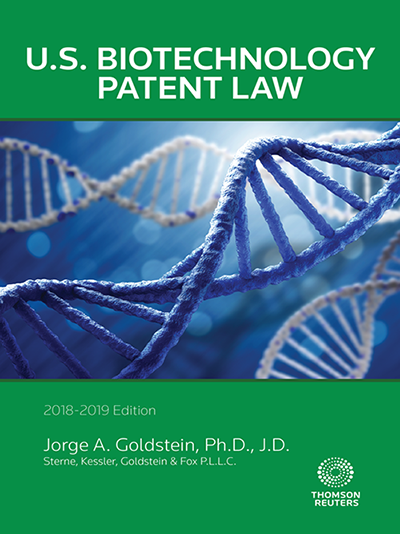U.S. Biotechnology Patent Law, 2018-2019 authored by firm Director Jorge A. Goldstein, Ph.D., is an update to the second edition. This book is a highly readable and well-organized desktop companion for practicing attorneys, and patent agents, seeking effortless entry into U.S. case law dealing with patents in modern biotechnology. Using the book’s descriptive subtitles or its double-entry tables, experienced or novice prosecutors, litigators, inside counsel or academicians can readily access any sub-area of the law, understand the legal background, and then find clear descriptions of the most important cases. The book’s focus is on biotechnology cases decided by the Court of Appeals for the Federal Circuit, its predecessor, the Court of Customs and Patent Appeals, the U.S. Supreme Court, and – when relevant – the U.S. Patent & Trademark Office Appeal Boards.
U.S. Biotechnology Patent Law features a contemporary format and feel, in both print and electronic formats. Each important biotech case is prominently highlighted and includes, in order:
- A summary and relevance of the holding;
- Separate patent claims (since the holdings in patent law can only be understood in reference to the claims – Are they methods? Products? What are the exact words and limitations? – the author has separated the involved claims for immediate access.);
- Technology drawings or other facts needed for a clearer understanding; and
- Verbatim citations and quotes from the tribunal.
Throughout the publication, there are comments contained in shaded boxes, allowing the reader to easily distinguish the discussions in the cases from the opinions of the author. These comments include trends in the case law, critiques of outlier cases, and attempts to provide unifying themes to the historical and thematic development of the case law. Also included are diagrams that, at a glance, provide understanding of a body of case law, such as, for example, the development of a drug from early research to a time after approval by the FDA, or a summary of enablement and written description. The comments and diagrams are tabulated at the beginning of the book in a “Table of Comments.”
And, featured at the end of the book are a series of appendices in the form of double-entry tables that provide additional access to the case law. For example, if readers look for cases on antibodies across all statutes of the patent law, they find them in the appropriate row; if they want cases dealing with enablement across all scientific areas of biotechnology, they find them in the appropriate column; and if they want only enablement cases on antibodies, they find them in the cell at the intersection.
Highlights of This New Edition
Among the numerous revisions in this 2018-2019 Edition of U.S. Biotechnology Patent Law are the following:
Chapter 3 Eligibility: Expanded discussion of natural compositions that have been purified as well as the addition of more nonprecedential case decisions on Mayo Collaborative Services v. Prometheus Laboratories, Inc.
Chapter 5 Enablement: New Comments on the application of the Wands factors to chemical claims and enablement by reference to the state of the art and its limits, a new section on the use of after-arising evidence to prove or disprove generic enablement, and amended discussion of the time dependence of enablement of after- arising technology.
Chapter 6 Written Description: A new section on the written description of a specific embodiment or subgenus, a new comment on whether the “antibody exception” of Noelle v Ledermann is still a good law and several new or revised comments relating to after-arising embodiments.
Chapter 9 Novelty: New Comment on the interpretation of product-by-process claims for novelty purposes and additional case law discussion regarding The doctrines of inherent and accidental anticipation.
Also included are discussions of recent cases, including:
- In re Bhagat (Fed. Cir. 2018)
- Vanda Pharm. v. West-Ward Pharm. (Fed. Cir. 2018)
- Storer et al v. Clark (Fed. Cir. 2017)
- Amgen Inc., et al v. Sanofi, et al (Fed. Cir. 2017)
- Stanford v CUHK (Fed. Cir. 2017)
- In re Nordt Development Co. (Fed. Cir. 2018)
- Monsato Technology LLC v. E.I. Dupont De Nemours & Company I (Fed. Cir 2018)
- Millennium Pharma. v. Sandoz, Inc. et al (Fed. Cir 2017)
Related Industries
Related Services

Receive insights from the most respected practitioners of IP law, straight to your inbox.
Subscribe for Updates
